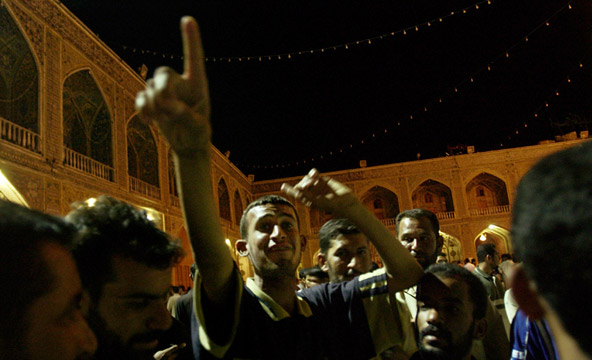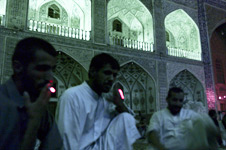
Najaf, Iraq, 18 August 2004. A young follower of Moqtada al Sadr reports seeing a vision of the disappeared Imam, the Mahdi, which foretells the end of the world.
Photograph: Thorne Anderson, Corbis.
SUNGSU CHO
Cho is doing something to a cigarette with his fingers. He’s rolling it back and forth until the tobacco falls out onto a sweat damp handkerchief full of black hash. He mixes the tobacco with the stuff we scored in Baghdad and then puts it back in the cigarette like a surgeon. Cho is the acknowledged master of this art and executes his moves with precision with the same fingers that sold vegetables in a market in Seoul.
Cho would go anywhere in the war and if he wanted you to stick around, he would say, "Yeah, you stay here with me, OK." Distracted and tired, he would make you dinner with the kimchi he had flown in from Seoul. I wrote the captions on his photographs because it wasn't easy for him. Cho's father is a retired South Korean military officer, and I always wanted to know what happened that sent Cho to war zones, but it was something his father never got over. I want to weep seeing him there in the car next to his pile of forgotten Nikons.
Up front, Cho's driver Ibrahim is getting upset. From the back seat I can see him twisting around, trying to figure out what will stop Cho from going through with it but Ibrahim is forced to watch the road for speeding traffic, insurgents hunting the roads and American convoys. We are passing Hilla and Babylon, heading north at eighty miles an hour into a highway of bombs and ten-mile traffic jams. Ibrahim is spooked because his passengers are going to get high and fill his car with hash fumes. Ibrahim keeps twisting around in the driver's seat to give us a look, but there's nothing he can do. I can tell he thinks that the trip is another bad luck proposition from the nervous animal sounds coming from his throat. We speed down the road, while Ibrahim swerves away from other cars and twitches the wheel back and forth. "It's total fucking bullshit." Cho says, and lights up just as we cross into the Sunni triangle. He is referring to everything. Thirty miles south of Baghdad, the highway that runs through the towns of Latayfiya and Yusufiya is one of the most violent stretches of road in the country. It is a major artery for religious pilgrims on their way to Najaf and a critical supply route for goods from Kuwait. In a zone from al Haswa to the outskirts of Baghdad, the sons of the Sunni farmers attack U.S. forces and anyone connected to the provisional government. Everyone is a potential target. After the bombs detonate and throw columns of oil-black smoke into the air, the fighters disappear into a network of irrigation canals and palm groves along the Euphrates. American patrols never come close to owning this road. Instead, they roll down it at high speed with their guns up, waiting for the high signaling crack of a Kalashnikov and the blood-starved spirits of the air.
I watch the low dust-colored buildings retreat along the sides of the highway, hiding men with rocket launchers and rifles who watch the stream of cars between Baghdad and Shiite central Iraq. We have white rimes of salt under our arms from the sun. It is Friday afternoon, the terminal stages of July and we are going steadily through light that is gold and then red as it falls on the stands of palms along the Euphrates river. The sun is burning in the west under the empty screen of the sky.
Cho has this handsome Frankenstein face and he takes a drag and lets it out again and car fills up with the smell of dope. We smoke in the back and hide our faces from boys selling soft drinks by the side of the road. Children work as spotters for kidnapping teams. When Ibrahim finally cracks a window, the vapors stream out behind the car in a comet's tail and the purified dread washes out of us. Riding through this dark stretch that spawns hundreds of fear myths, we are outside the war. The hash makes us feel invisible.
A few weeks earlier, during the first clashes between the U.S. military and the Mahdi Army, I found a driver in front of the Hamra hotel who panicked on the way south to Najaf. His name was Hekmat and he finally lost it on the road near Latayfiya. We had stopped at a U.S. roadblock, which is where Hekmat quit and said he couldn't go any farther. He was faking car trouble and said he couldn't get the car to start, but he had secretly thrown a switch under the dash to disable the ignition. If I'd found the switch I would have stolen the car. Traffic was backed up for miles because a patrol had found a roadside bomb and the Americans providing security for the sappers were nervous. They were standing in a row behind a coil of razor wire stretched across the asphalt with their weapons up, with rounds in the chambers. An Iraqi man walked forward with his four-year-old son out in front of him until a soldier lowered his M-16. The man wanted to ask when the road would be clear. They didn't know. A young tanker yelled to me, "Hey how's the sushi in California?" He wanted to know how reporters moved around the Mahdi Army areas. I told him about the safe passage letters I carried and how they didn't work all the time, but the soldiers wouldn't let me through because their lieutenant hated reporters and the letters made them suspicious.
We listened to the sappers detonate the roadside bombs a mile down the highway. The sound is a giant fist hitting a soft pillow. While I was trying to talk to the soldiers at the roadblock, Hekmat turned his car around and headed back to Baghdad. I caught a ride with some workers in a bus going to Iskandariya. The driver, who knew the way around roadblocks, turned off the highway into the patchwork of fields and irrigation canals around the town. A few minutes later, deep in this Euphrates River farmland, I saw a thin kid in a white dishdasha looking through the windshields at the passengers of the cars. The kid had a walkie-talkie he was using to talk to fighters down the road about who was coming through their sector. He wasn't interested in the workers and the beat-up bus and missed the foreigner. It was amazing how close you could get to the edge and still come back, like an amusement park ride or a submarine tour of the bottom of the ocean.
 LEAD IMAGE: 17 August, 2004, Najaf, Iraq. Young followers of Moqtada al Sadr inside the shrine of Imam Ali during the siege.
LEAD IMAGE: 17 August, 2004, Najaf, Iraq. Young followers of Moqtada al Sadr inside the shrine of Imam Ali during the siege.Photo: Thorne Anderson
© Phillip Robertson, 2009-2020.
